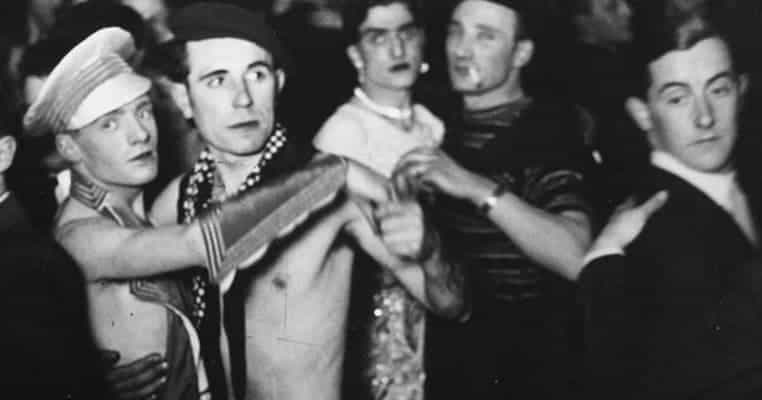Germany emerged from the First World War broken and disillusioned. Defeat in the Great War heralded the end of the monarchy, with the Kaiser giving way to the Weimar Republic, named after the small German city that had once been a hotbed of both artistic and scientific progress. Before long, American money was pouring into the new-look country, and people weren’t afraid to spend it. Whether because they wanted to simply forget the trauma of the war or because they realized that such peace and relative prosperity was bound to come to an end sooner rather than later, the German people partied hard. Indeed, from 1923 onwards, the ‘golden age’ of the Weimar Republic was characterized by its decadent parties just as much as it was for its economic troubles and weak governments.
The cabaret scene of 1920s Berlin is still famous to this day. Here, in dance halls and cabaret clubs, the old rules were tossed aside. Prussian conservatism gave way to sexual liberation, equality and hedonism. Gender rules were not just bent but smashed altogether. Indeed, some of the things that went on would even be shocking today. So, from drugs and sex to underage prostitution, gangsters and murders, here are some of the most scandalous aspects of this decadent decade:

1. Cocaine was all the rage, though other drugs were legal and helped fuel the decade-long party
Germans famously love their beer. But during the heady days of the Weimar Republic, the decadent nightlife of Berlin, in particular, was fueled by something a lot stronger. Quite simply, the city was awash with drugs, and people of all ages were happy to experiment. Cocaine was the number one stimulant, though many people also enjoyed heroin, while tranquilizers were also taken by many, especially those who needed extra stimulation to keep up at the city’s many crazed parties.
To some extent, the rise in drug-taking was down to the fact that many of the things the Germans had been used to getting a kick out of were no longer available. Under the terms of the Treaty of Versailles, signed at the end of the First World War, Germany lost its overseas colonies as well as some important international trade routes. Tea and tobacco supplies dried up almost overnight. Luckily, other pick-me-ups were soon readily available. Almost all drugs, including cocaine and heroin, were legal to buy, and it was said that you could buy them on most Berlin streets during the 1920s. Incredibly, Weimar Germany ended up the sole consumer of Peruvian cocaine, while 80% of all the coke made by domestic pharmaceuticals ended up going up the nostrils of Berliners.
Nightclubs and cabarets were also good places to get your fix. Indeed, in Weimar Berlin, some of the most notorious establishments even gave their customers drugs upon entering. At the time, such rampant drug use was not seen to be problematic. Quite the opposite, in fact. With Germany still suffering both physically and emotionally from the Great War, countless veterans were being prescribed morphine and even heroin in order to help them deal with their pain. Even people who hadn’t been to the front felt a need to get out of their heads and try and forget the national trauma.
It was only much later that drug use became linked to addiction – by that point, of course, the good times of the Weimar Republic were over. Even then, however, drugs carried on fueling German society. Indeed, recent research into the Third Reich has revealed the extent to which huge numbers of Nazi soldiers were given methamphetamine, with the regime using hard drugs to try and fuel their bid for world domination.

